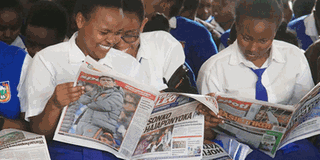State must account for all girls once schools re-open

Students of Naromoru Girls Secondary School, Nyeri read copies Taifa Leo during the paper's activation last March. The government must ensure each girl returns to school post-Covid-19. PHOTO | JOSEPH KANYI | NATION MEDIA GROUP
Her boyfriend deserted her the moment she broke the news that she was pregnant after two months of courtship. Last month, she slept out for two nights leaving her mother to babysit and her mother, now fed up, chased her away.
*Beryl Nanjala got pregnant while in Class Seven, last year. She had to drop out of school to take care of the baby who is now eight months old. Her mother, Eunice Atemi* has eight children and is not ready to feed an extra mouth.
Her second born daughter, 14, is heavy with child. She got pregnant in March, but isn’t sure who, between the two men she dated, is responsible for her pregnancy - a bodaboda rider in Kibra slums, Nairobi and a tout in Kawangware.
Young women have been forced to discontinue their studies after getting pregnant, especially girls from disadvantaged backgrounds.
FORCED MARRIAGES
Since schools closed following the breakout of Covid-19 pandemic, girls are more exposed to sexual exploitation, housework, forced labour, early pregnancy, forced marriages and even the risk of death as they give birth.
We should be alert to the fact that our children are sexually active. These girls clearly need access to sexual and reproductive health services to reduce the rising number of children giving birth to children.
School is the best institution to offer comprehensive sexual education because learning spaces play a vital role in enabling sexual and reproductive health and rights for all.
Education is the key to a better life. It is the catalyst for change, especially for girls and women. Its transformative nature requires that education is of good quality and can challenge gender norms and stereotypes that have been perpetuated for decades.
In informal settlements and rural areas, the main culprits of sexual abuse and exploitation are boda boda riders, touts, close relatives, teachers and sugar daddies aka ‘sponsors’ among other predators. They lure school girls with money, snacks and free rides.
Although Kenya has a policy that allows pregnant girls to continue their education at whatever level, many girls find themselves bidding farewell to their academic dreams due to reasons beyond their reach.
SEXUAL ABUSE
Poverty has seared the very existence of many households across the country, making it hard for parents to send daughters back to school after getting pregnant. Sometimes the parents are discouraged after educating their daughters with the meagre earnings they get from eking out a living doing odd jobs, just for them to get pregnant.
Things are tougher for girls during these unpredictable times of Covid-19. For millions of girls across the country, apart from providing education, school is a sanctuary where they take refuge from unbridled sexual abuse and other forms of violence.
The girls have been home for almost three months now, and the longer they stay out, the more they are exposed to multiple challenges.
Once schools reopen, the Ministry of Education should provide a gender disaggregated data, showing how many girls are back in school and how many cannot be accounted for.
The government must make a deliberate effort of tracking and tracing those affected by Covid -19 if they fail to report back to school. This will ensure no girl is left behind in education regardless of her social background.
The taskforce on re-opening of schools led by Dr Sarah Ruto and the National Response Committee on Covid-19 should include women’s and girls’ needs in their emergency response guidelines.
These two agencies should weave in tailor-made information for girls and women, and the risks staring at them. These vulnerable groups should be educated on how to report sexual abuse and other abuses they are subjected to during this time. It would be good to let the girls voice their opinion on measures put in place to cushion them against the ravaging disease.
The national and county governments must also work with communities including school heads and teachers so that they are in the know on what is happening to the girls.
The writer is a media consultant who comments on social issues.





